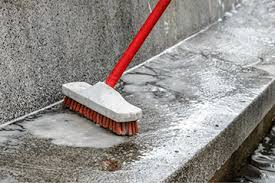If you’re just driving down the street, there’s about an eight in 10 chance that you’ll see somebody just out there with a pressure washer and a wand and just blowing off the dirt and debris and moving that across their driveway. Now that was me in the past and it wastes a ton of time, so let’s jump in and show you the better way to clean the driveway. It will save you time and give you a better end result.
Direction of Work on the Site
So, let’s look at how to prepare for work. First, develop a plan of attack. Regardless of whether you are going to clean a patio or a path, you need to take into account the slope of the site.
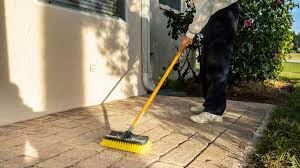
You should always start where you have the highest level of concrete and it slopes away from that point. Why we want to do this is because you don’t want to start at a low point, clean it, and then work your way up to a high point where dirt, grime, and debris will just come and settle on the surface you just cleaned. So start at the highest point, let the dirt and debris run over the still dirty concrete, then work your way across. If you are going to clean a driveway, a common direction will be starting from the garage, the work across and then work towards the street or a public road.
Items You Will Need for Concrete Cleaning
For the concrete cleaning process you will need either a broom and or mop and a scrub brush (not metallic). You also prepare a pair of rubber cleaning gloves, a spray bottle, a dustpan, etc. I recommend gloves made of thick rubber that are impervious to liquids and resistant to chemicals like bleach. Also, make sure the gloves are the right size. I personally prefer using URBANSEASONS Dishwashing Rubber Gloves for Cleaning
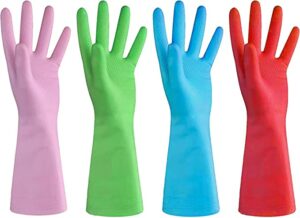
If you only need to do a standard cleaning and there is no excess liquid on the concrete surface, sweep the area with a broom of any loose debris before using the following methods.
The type of broom you use to clean your concrete will depend on the type of concrete you have. If you have smooth concrete, you can use a regular push broom. There is a wide selection of mops that are made of strong and wear-resistant materials for repeated use specifically on concrete street surfaces. For example, you can use Heavy Duty Broom for Driveway Garage Yard Patio Concrete Floor Cleaning.
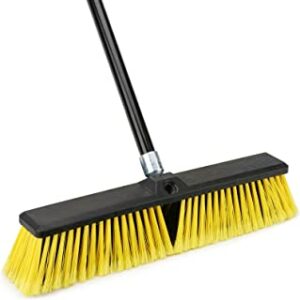
If you have textured or stamped concrete, you’ll want to use a soft-bristled broom so you don’t damage the surface. You may also need to use a power washer on very dirty or stained concrete.
Depending on both the size of the stain and how much needs cleaned in general, you may not need every single method found below. All of the methods below will require a scrub brush to remove a stain. Be sure not to use a metallic scrub brush because these brushes can leave behind metal bits that will rust and stain your concrete.
Preparation of Concrete for Cleaning
First, soak your driveway with water using a hose. Check if the hose is well connected the house drains. If it is not, the driveway will be slippery when wet and you may fall. Sweep any large debris off your concrete with a push broom. You can also use a blower to remove leaves, dust, and other small particles.
Once the liquid has been soaked up, and the litter or baking soda has been swept up and disposed of, then your concrete is ready to be cleaned.
In order to dry up standing liquids on your concrete, such as grease or wine, pour cat litter over the affected area and let it sit for about 30 minutes. If you don’t have any cat litter, baking soda will also do the trick.
Let it sit for a few minutes before scrubbing with soapy water and a brush attached to the end of your pole.
Cleaning with Household Items
Vinegar and Baking soda
If you’re looking for a natural way to clean your concrete patio or sidewalk, vinegar or baking soda is a good option. While cleaning concrete with bleach or detergent can be effective, it can also be toxic to plants. If you’re worried about the safety of nearby plant life, this solution is for you!
To clean your concrete surface, mix equal parts water and vinegar (or water and baking soda) in a spray bottle. Add a few drops of liquid dish detergent, then spray the mixture on your concrete. Let the liquid to penetrate the area for 20-30 minutes, and scrub with a stiff-bristled brush.
Bleach and Dishwashing liquid
To clean your patio or driveway effectively with bleach, water, and dishwashing liquid, mix 1/8 cup of the dishwashing liquid with bleach and water. Then, apply it to the concrete and let it sit for 15 minutes before scrubbing with a brush. Rinse off the solution and let the area dry completely.
You can also use this solution to clean your patio furniture, grills, and other outdoor equipment. Just be sure to rinse everything off thoroughly afterwards so the bleach doesn’t damage any surfaces.
Cleaning with Concrete Cleaner or Degreaser
If you have oil stains, treat them with a degreaser before proceeding with the cleaning. You can make your own degreaser by mixing 1 part dish soap with 2 parts water. Apply the degreaser to the stain and scrub it in with a stiff brush. Rinse it off with water and let it dry completely before continuing. You may also use full-strength commercial cleaner or degreaser on tough spots like tree sap or gum.
Concrete cleaners and degreasers are typically made from concentrated alkaline soap. This will loosen up the oil making cleanup easy. It does not, however, break down the oil so it is not effective for concrete that has been stained for a long time. This solution works best on porous concrete.
Oil Eater Original 1 Gallon Cleaner and Degreaser – Dissolve Grease Oil and Heavy-Duty Stains – Professional Strength
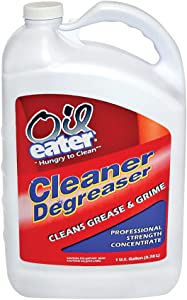
Oil Eater formulas have 3 times the active ingredients than other leading brands. They are also safe to use on nearly any surface and made in America! These powerful formula performances are unmatched making it a great choice for anyone looking for top of the line products.
Oil Eater offers an array of all-purpose cleaners, degreasers, absorbent pads, parts washer & accessories.
Whether you want to clean your kitchen or an industrial floor, Oil Eater is the perfect solution. Our formulas are safe for multi-surface use and can be diluted for a variety of needs.
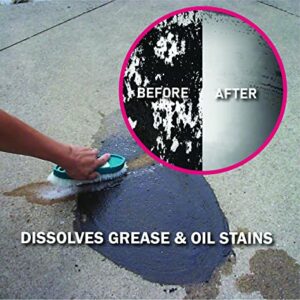
FAQs
What is the black stuff on concrete?
The greenish-black stuff on your concrete patio is probably mold, mildew, or moss. When rain or humidity make things damp or moist, mold and mildew can grow in the nooks and cracks of concrete pavers or bricks.
Will straight bleach harm concrete?
Although concrete is a very low-maintenance option for driveways, it can still accumulate dirt, stains, mold and mildew over time. However, you don’t need to fret! A simple solution of bleach will do the trick in removing most if not all residual blemishes while also deodorizing and killing any mold or mildew present.
Will white vinegar clean concrete?
White vinegar and some scrubbing with a brush can even remove decades-old rust stains from concrete effectively while also being eco-friendly.
Do you have to rinse bleach off concrete?
Always dilute bleach with water before using it to clean your floors. To use bleach most effectively on your floors, follow these steps: pre-mop the floor to remove any dirt or grime, mop the floor with a diluted bleach solution, let the bleach sit for at least five minutes and rinse thoroughly with water.
How do I keep my concrete from turning green?
You can’t cover your patio with copper sheets, but you can spray on a liquid solution of copper that will soak into the top surface of the concrete pavers. This copper will stop the growth of the pesky green and black organisms in their tracks. The easiest way to apply the copper is to buy copper sulfate crystals.
